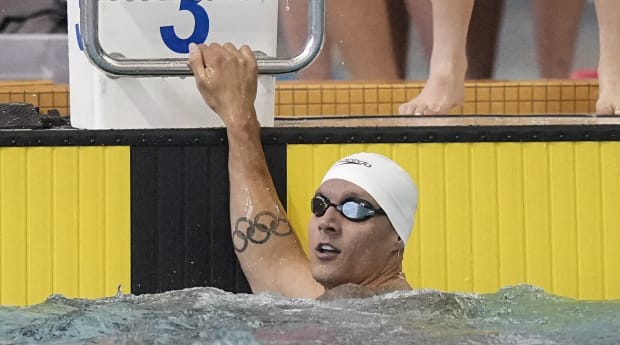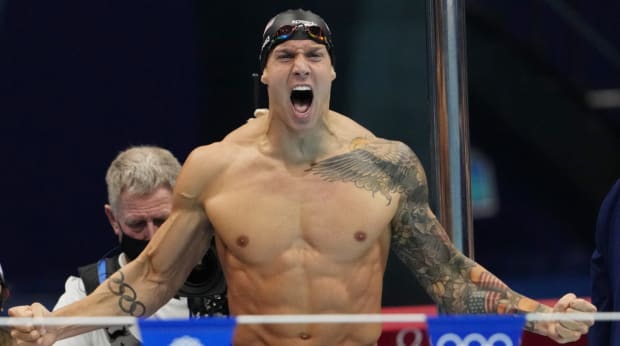INDIANAPOLIS — While spotlights circled and music blared at the IUPUI Natatorium, Caeleb Dressel stood on the other side of a huge blue curtain—the quieter, darker side, away from the competition pool—and smiled. He stood where he’s never been as an adult Saturday night: on the periphery of swimming, after being a non-factor all week at the USA Swimming National Championships. The U.S. team for the biggest international meet of the year, the world championships, would be announced in a few hours. For the first time since 2015, Dressel wouldn’t be part of it.
And he was O.K. with it.
“I’m good,” Dressel said to a group of reporters in his first media appearance in more than a year, since he virtually disappeared from the sport. “I’m really good right now. Very indifferent about my results, kind of being pulled both ways. A little embarrassed, like, what just happened? But then also fully understanding of what just happened and the year I’ve had. I get it.
“I’ve always loved the sport and how fair it is. I’m proud of myself and the results, believe it or not. I know it’s shocking. This is definitely something different. I wouldn’t have changed anything about this year.”
The preeminent American male swimmer hadn’t appeared in a major meet since abruptly leaving the 2022 World Championships in Hungary with what was characterized as a health issue. His return to competition here was inglorious, failing to qualify for worlds in four events. But at least the decorated 26-year-old was back, taking the first steps out of a deep, dark hole.

Brynn Anderson/AP
Dressel declined to share the details of what happened in Budapest, but said “my body kept score” of the stress he was under.
“It all came down,” he said. “There’s lot of things I shoved down and they all came boiling up. So I didn’t really have a choice. I used to pride myself in shoving things down and pushing it aside. It worked for a very long time in my career … until I couldn’t do that anymore. A bunch of things kind of came crashing down at once. I knew that was my red flag. Multiple red flags. A huge red flag.”
Dressel’s Gator Swim Club coach, Anthony Nesty, described the seven-time Olympic gold medalist’s time away as a mental health break.
“Mental health is a serious issue, and everybody deals with it differently,” Nesty said. “Sometimes it takes time to heal from that, and everybody heals differently.
“He was going to start swimming when the time was right for him. Obviously last summer didn’t end well. When an athlete like that goes through some issues it’s a big deal not only for him and his family, for the program, for U.S. swimming. An athlete like that has lots on his shoulders. I wanted everything removed from his shoulders. He needed to focus on him.”
That process required about eight months out of the water—an eternity for a swimmer. Dressel characterized it as a “retirement.” It took a lawn-mowing epiphany on his farm outside Gainesville, Fla., to realize he could come back to swimming because he wanted to, not because he had to.
“I really like to mow,” Dressel said. “Got a sweet, zero-turn mower. I’ll never forget the spot [on my farm] I was going around. It just popped in my head, if I never go back to swimming, I’m going to be O.K. That’s how I somewhat knew I was ready to come back.”
It wasn’t going to be easy, though. No swimmer can short-cut the arduous and continuous conditioning required to perform at a high level, not even Dressel. That showed here at this meet.
Tuesday night, he slouched at a table in the sports bar of the JW Marriott with the hood of his gray Speedo sweatshirt shrouding his head. His wife, Meghan, sat to his left. Dinner plates and an uncertain swimming future lay in front of them.
This was after placing 29th in the preliminaries of the 100-meter freestyle—an event in which he is the American record holder and the fourth-fastest man in history. Largely invisible for the past year, this was a jarring reappearance.
Scratches from other swimmers moved Dressel into the “C” final, which was contested after the top 16 competitors in the event had performed. Dressel began that night session sitting in the stands with his family, an unusual sight while the marquee races were being contested. A new 100-free national champion (Jack Alexy) was crowned. When it was time for the reigning American and Olympic champion in the event to compete, most of the fans had left the IUPUI Natatorium.
Just as in his morning swim, Dressel faded in the second 50, finishing third in the heat in 49.64 seconds—a shadow of the explosive athlete who clocked a 46.96 four years ago and 47.02 to win gold at the Tokyo Olympics in 2021. His three events that followed last week were similar.
Returning to part-time training in late February and not getting back to a full eight practices per week until May left Dressel unprepared for this meet, his first major competition since his extended break.
Where Dressel is in the healing process remains unclear. But those who know him characterized his mere presence here and willingness to compete—while far from fully ready—as a significant step forward toward the goal of making the U.S. team for the 2024 Olympics.
“Mentally, he’s right where he needs to be,” Nesty said. “He’s happy, first time I’ve seen him happy swimming in a long time. A happy athlete is a fast athlete. Obviously, he’s not fast yet, but under the circumstances, where he’s at, he did post some fast times.
“Obviously, he wanted to do better. But for us, it was posting times that we could improve upon. … He was right there, but he just can’t close the deal. That’s just the layoff. I think he lacks power, which obviously if you haven’t been in the weight room for a long time, that shows up. I think he’s in a good spot. We just need to start training and get ready for next summer.”

Rob Schumacher/USA TODAY Sports
Dressel might not have the muscle mass he possessed at his peak two years ago, but he still looks the part of a sculpted, elite athlete. His starts, arguably the best in swimming history, remain electric. “We got a classic shot of Dressel beating everyone to the 15 [meter mark],” said 16-year-old Thomas Heilman, who swam next to his idol—and beat him—in the 100 butterfly. But in swimming there is no hiding a lack of conditioning, and beyond that it remains to be seen whether Dressel’s mind will allow his million-dollar body to go where it has before.
The pressure on elite athletes, especially those who compete in individual sports, has never been more open and evident. That’s largely because they’ve been increasingly willing to publicly disclose the mental struggles that accompany their exploits. Michael Phelps was one of the first to open a window into that reality, and Simone Biles’s tribulations in Tokyo two years ago put the issue front-and-center in worldwide athletics.
Now Biles is making a comeback to competition. Here, Tokyo gold-medal breastroker Lydia Jacoby qualified for the world championships and then opened up about her difficulties after experiencing that improbable breakthrough at age 17.
“I think I was in a lot of denial about my post-Olympic depression,” Jacoby said. “I hit the deny-deny-deny button. There were days I couldn’t get out of bed. I’d go to practice and go through the motions. It was impacting a lot of areas of my life.
“I started thinking of swimming as a career instead of a passion. I stopped thinking about doing it for me.”
Dressel has taken breaks before, but never one of this length and never after shutting himself down in the middle of a major competition like he did in 2022. He’s always been tightly wound and relentless about seeking improvement, which is a double-edged sword.
“I knew in kindergarten this kid was a perfectionist,” his mom, Christina, told Sports Illustrated in 2021. She described young Caeleb’s preoccupation with making sure his crayons were all the same length, and his despair over losing a single Lego. “He could be too hard on himself.”
If Dressel has been beating himself up, the rest of his sport wants to lift up the popular and charismatic star. The reaction to his presence on the pool deck at IUPUI was overwhelmingly positive, and his Gator Swim Club teammates spoke glowingly about his positive impact there since returning to practice.
“There’s so much you don’t see on a day-to-day basis,” Katie Ledecky said to a group of reporters. “Just the joy he brings to the pool deck every day, the impact he has on his teammates. When he came back in February, it was just a different atmosphere.”
Ledecky specifically mentioned the impact Dressel has made on sprinter Macguire McDuff, a Florida sophomore who qualified for the “A” final in the 100 free. “Training with Caeleb every day, I think Macguire will tell you he has learned a lot from Caeleb and it’s inspiring to be next to him,” Ledecky said.
Indeed, after Caeleb and Meghan Dressel finished their dinner Tuesday night in the JW Mariott, McDuff approached from a nearby table. He sat down for a lengthy discussion with Caeleb at the end of a strange night. The Gator sprinter nobody knew much about had finished seventh in the 100-freestyle that night, while the household name had toiled through a humbling C final.
At the conclusion of their talk, the two men rose and embraced. Watching the scene, you got the feeling that McDuff was acting on behalf of an entire sport that wants to give Caeleb Dressel a supportive hug.
“I needed every day I got [away from swimming], needed every minute I got,” he said. “But I missed it almost every day. Missed the little things in the sport—blowing bubbles, my toes on the grip tape [on the starting block]. I missed the chlorine, believe it or not—I hate chlorine—and that’s how I knew I wanted to get back. I didn’t need to, I wanted to.”







